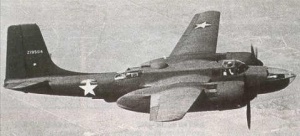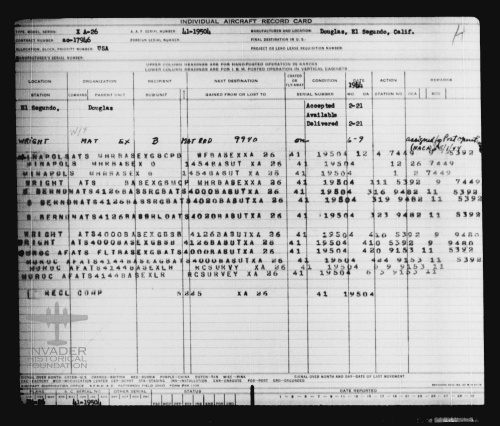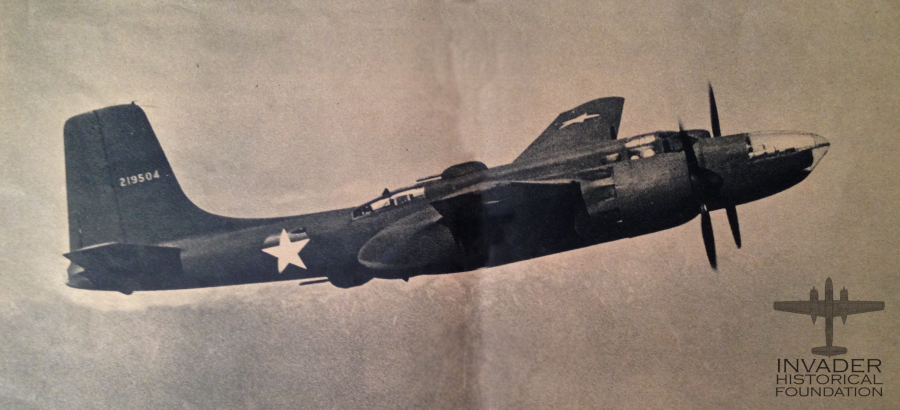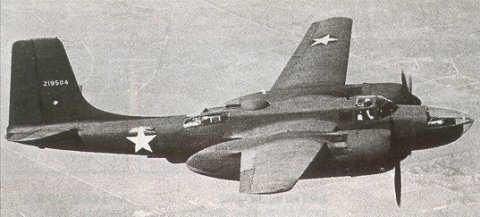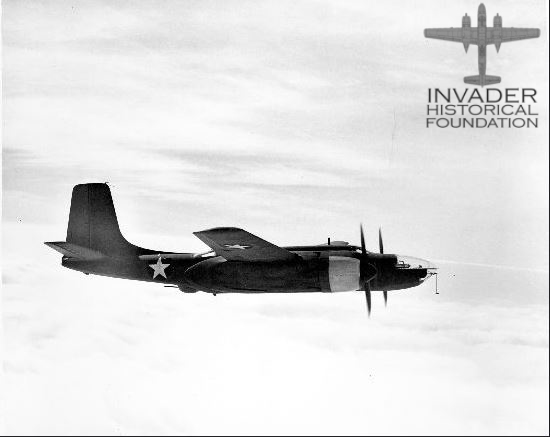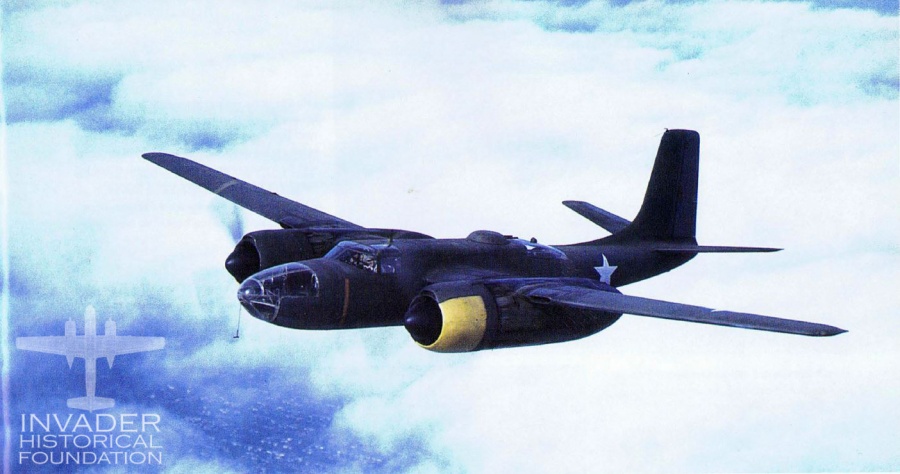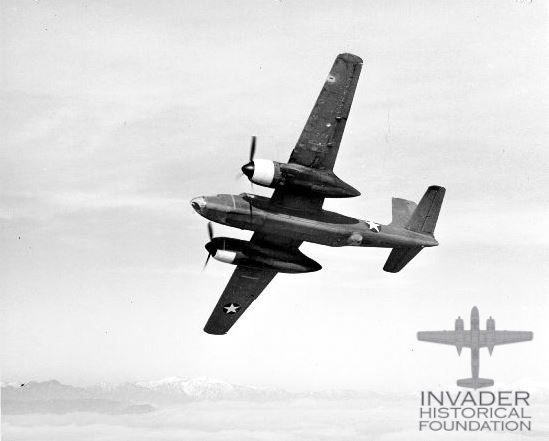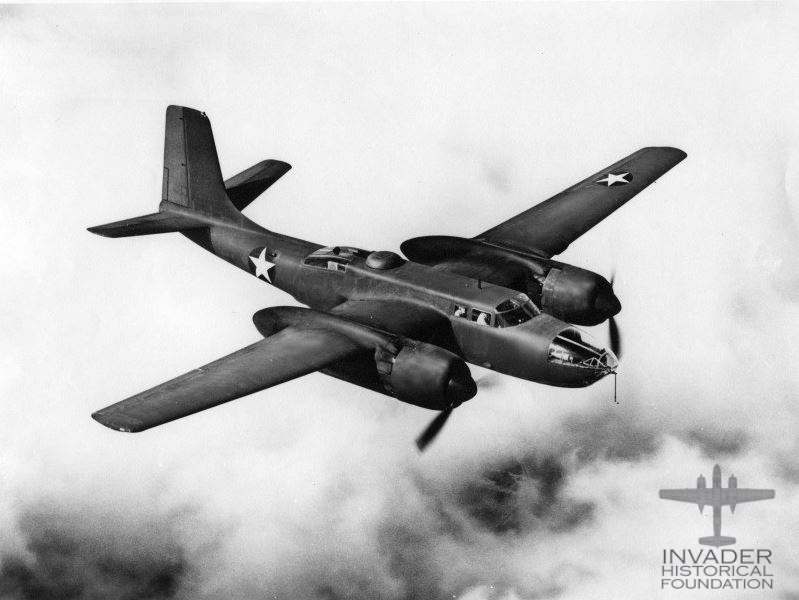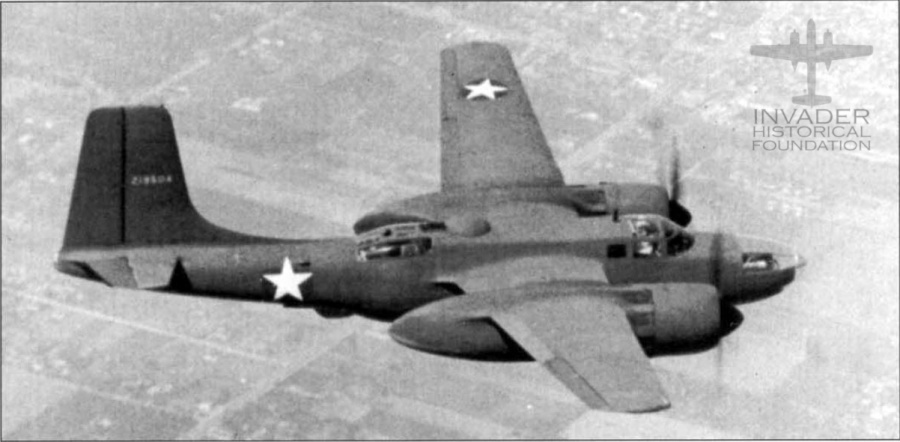41-19504: Difference between revisions
No edit summary |
No edit summary |
||
| (28 intermediate revisions by 2 users not shown) | |||
| Line 62: | Line 62: | ||
This plane was the first working A-26 Prototype to be fully operational. In July of 1941 Douglas built a full-sized wooden mock-up of the plane with dummy weapons to pitch to the Air Force. That initial display culminated in a contract for two operational prototypes - this plane, and [[41-19505]] (The XA-26A). Later, the Air Force added a third prototype, the XA-26B ([[41-19588]]). | This plane was the first working A-26 Prototype to be fully operational. In July of 1941 Douglas built a full-sized wooden mock-up of the plane with dummy weapons to pitch to the Air Force. That initial display culminated in a contract for two operational prototypes - this plane, and [[41-19505]] (The XA-26A). Later, the Air Force added a third prototype, the XA-26B ([[41-19588]]). | ||
This plane was constructed with a glass nose (many sources cite it as "glazed"). | This plane was constructed with a glass nose (many sources cite it as "glazed"). | ||
The Douglas XA-26 prototype first flew on 10 July 1942 at Mines Field, El Segundo, CA with test pilot Benny Howard at the controls. Flight tests revealed excellent performance and handling, but engine cooling problems led to cowling changes and elimination of the propeller spinners on production aircraft. Repeated collapses during testing led to reinforcement of the nose landing gear. | The Douglas XA-26 prototype first flew on 10 July 1942 at Mines Field, El Segundo, CA with test pilot Benny Howard at the controls. Flight tests revealed excellent performance and handling, but engine cooling problems led to cowling changes and elimination of the propeller spinners on production aircraft. Repeated collapses during testing led to reinforcement of the nose landing gear. | ||
This plane served as the prototype for what would become the C model Invader - those equipped with glass noses to aid in bombing. One observable difference between the prototype models and the production models was the "propeller spinner" - the cone-shaped piece in the middle of the propeller blades. The prototype units were equipped with this feature, but none of the production models had them. | This plane served as the prototype for what would become the C model Invader - those equipped with glass noses to aid in bombing. One observable difference between the prototype models and the production models was the "propeller spinner" - the cone-shaped piece in the middle of the propeller blades. The prototype units were equipped with this feature, but none of the production models had them. | ||
[[File:XA-26_Side.JPG|900px]] | |||
==Operational History== | ==Operational History== | ||
Test flight | *10 Jul 1942 - Test flight at [[Mines Field]], El Segundo, CA. Purportedly the plane made additional test flights, but the exact dates of these fights is not known to me. | ||
Purportedly the plane made | *21 Feb 1944 - Accepted into USAF Inventory at [[El Segundo]], CA | ||
*9 Jun 1944 - Flown to [[Wright-Patterson]] AFB, OH. Assigned to [[NACA]] for testing. | |||
*26 Dec 1944 - Assigned to the [[1454th Base Unit]] at [[Minneapolis-St.Paul]], MN for Armament testing. | |||
*2 Jan 1945 - Recieved by 1454th Base Unit. | |||
*16 Mar 1945 - Assigned to [[4000th Base Unit]] at [[Thermal Air Field]], CA for Armament testing. | |||
*19 Mar 1945 - Recieved by 4000th Base Unit. | |||
*23 Mar 1945 - Transferred to the [[4020th Base Unit]] at Thermal Air Field, CA for Armament Testing. | |||
*10 April 1945 - Assigned to [[4126th Base Unit]] at Wright-Patteron AFB, OH for Armament Testing. | |||
*20 April 1945 - Assigned to 4000th Base Unit at [[Muroc Army Air Field]] (later known as Edwards AFB), CA. | |||
*24 APR 1945 - Recieved by 4000th Base Unit. | |||
*3 Jun 1945 - Recommended for scrapping. | |||
*9 Jun 1945 - Approved for scrapping, struck from Inventory. | |||
<br/> | |||
[[File:41-19504-IARC.jpg|500 px]] | |||
==Accidents== | ==Accidents== | ||
This plane was | '''16 MAR 1943''' | ||
This plane was listed as severely damaged in a landing accident at Los Angeles Municipal Airport. The pilot was Max A. Constant. He survived the crash. | |||
'''16 APR 1945''' | |||
This plane was involved in a Taxi accident due to mnechamical failure at the Murroc Field Test Area. It was moderately damaged. The pilot was William H. Connell. He survived the crash. | |||
==Known Crew== | ==Known Crew== | ||
Ed Heinemann - Designer | *Ed Heinemann - Designer | ||
Robert Donovan - Designer | *Robert Donovan - Designer | ||
Ted R. Smith - Designer | *Ted R. Smith - Designer | ||
A.M.O. Smith - Aerodynamist | *A.M.O. Smith - Aerodynamist | ||
Benny Howard - Test Pilot | *Benny Howard - Test Pilot | ||
*Max A. Constant - Test Pilot | |||
*William H. Connell - Test Pilot | |||
==Disposition== | ==Disposition== | ||
This plane was purpose built for testing. Upon completing its mission it was retired from service | This plane was purpose built for testing. Upon completing its mission it was retired from service. Some sources list this plane as subsequently written off 16 MAR 1943. This date coincides with an accident at Los Angeles Municipal Airport which lists the plane as severely damaged. However, this date is an error. It was involved in another accident in APR 1945, and it's official inventory control card shows that it remained in service until 9 JUN 1945. | ||
==Images == | |||
Luckily, being a prototype model, there are many images of this plane. This Prototype was the only prototype version to feature a glass nose. The other two had solid noses. One thing that is noteworthy of the photos of this plane is that when it was built the ground crew accidentally applied the incorrect serial number on the tail. As a result, many of the photos show the plane with "219504", but it should read "119504". Photos without a tail number were taken between the test flight in Jul 1942 and the acceptance into inventory in 1944. | |||
The XA-26 Protorype on the ramp. <br/> | |||
[[File:XA-26 profile.jpg|900px]] | |||
[[File:XA- | <br/> | ||
[[File:XA-26 front.jpg|900px]] | |||
<br/> | |||
[[File:41-19504 front.jpg|900px]] | |||
<br/> | |||
[[File: | The XA-26 Prototype during takeoff, 10 JUL 1942. <br/> | ||
[[File:XA-26 First flight.jpg|900px]]<br/> | |||
[[File:XA-26_Prototype.jpg|900px]] | |||
[[File:XA-26.jpg| | The XA-26 Protoype in flight.<br/> | ||
[[File:41-19504-2.png|900px]] | |||
<br/> | |||
[[File:XA-26.jpg|900px]] | |||
<br/> | |||
[[File:41-19504.XA-26.jpg|900px]] | |||
<br/> | |||
[[File:41-19504 Over CA.jpg|900px]] | |||
<br/> | |||
[[File:41-19504 in flight.jpg|900px]] | |||
<br/> | |||
[[File:41-19504 XA26.jpg|900px]] | |||
<br> | |||
[[File:41-19504. XA-26. 1942. WM.jpg|900px]] | |||
==Sources== | ==Sources== | ||
*Douglas A-26 Production List | *Douglas A-26 Production List | ||
*United States Air Force Accident Reports | *United States Air Force Accident Reports | ||
*United States Air Force Individual Aircraft Record Card | |||
*Francillon, René. McDonnell Douglas Aircraft Since 1920: Volume I. London: Putnam, 1979. ISBN 0-87021-428-4. | *Francillon, René. McDonnell Douglas Aircraft Since 1920: Volume I. London: Putnam, 1979. ISBN 0-87021-428-4. | ||
*Smith, A.M.O., "High-Lift Aerodynamics; the 37th Wright Brothers Lecture", AIAA paper 74-939, reprinted in the AIAA Journal of Aircraft, Vol. 12 No. 6, June 1975. | *Smith, A.M.O., "High-Lift Aerodynamics; the 37th Wright Brothers Lecture", AIAA paper 74-939, reprinted in the AIAA Journal of Aircraft, Vol. 12 No. 6, June 1975. | ||
| Line 110: | Line 152: | ||
[[Category:Experimental Planes]] | [[Category:Experimental Planes]] | ||
[[Category:Have Photo]] | [[Category:Have Photo]] | ||
[[Category:In Accident]] | |||
[[Category:Scrapped]] | |||
[[Category:Wright-Patterson]] | |||
[[Category:NACA]] | |||
[[Category:1454th Base Unit]] | |||
[[Category:4000th Base Unit]] | |||
[[Category:4020th Base Unit]] | |||
[[Category:4126th Base Unit]] | |||
Latest revision as of 20:13, 7 June 2020
| XA-26 Invader | |||
|---|---|---|---|
| Builders: Douglas Aircraft Company | |||
| Operators: United States Air Force | |||
| Ordered 1941 | |||
| Number Built: 1 | |||
| First Built: 1942 | |||
| GENERAL CHARACTERISTICS | |||
| Type: Light Attack Bomber | |||
| Dry Weight: - | |||
| Wet Weight: - | |||
| Length: 51' 3" (15.24 m) | |||
| Height: 18' 6" (5.64 m) | |||
| Wingspan: 70' (21.34 m) | |||
| Wing Area: 540 Sq. Feet (50.17 m²) | |||
| Speed: - | |||
| Max Speed: - | |||
| Ceiling: 22,100 feet (6,700 m) | |||
| Powerplant: 2x Pratt & Whitney R-2800-27 | |||
| Horsepower: 2,000 | |||
| Fuel Capacity: - | |||
| Range: - | |||
| Crew: 2 | |||
| Passengers: 1 | |||
| ARMAMENT | |||
| Nose Guns: None | |||
| Dorsal Turret: None | |||
| Ventral Turret: None | |||
| Payload: 6,000 lbs | |||
See also: List of Invaders by Serial Number
This plane was the first working A-26 Prototype to be fully operational. In July of 1941 Douglas built a full-sized wooden mock-up of the plane with dummy weapons to pitch to the Air Force. That initial display culminated in a contract for two operational prototypes - this plane, and 41-19505 (The XA-26A). Later, the Air Force added a third prototype, the XA-26B (41-19588).
This plane was constructed with a glass nose (many sources cite it as "glazed").
The Douglas XA-26 prototype first flew on 10 July 1942 at Mines Field, El Segundo, CA with test pilot Benny Howard at the controls. Flight tests revealed excellent performance and handling, but engine cooling problems led to cowling changes and elimination of the propeller spinners on production aircraft. Repeated collapses during testing led to reinforcement of the nose landing gear.
This plane served as the prototype for what would become the C model Invader - those equipped with glass noses to aid in bombing. One observable difference between the prototype models and the production models was the "propeller spinner" - the cone-shaped piece in the middle of the propeller blades. The prototype units were equipped with this feature, but none of the production models had them.
Operational History
- 10 Jul 1942 - Test flight at Mines Field, El Segundo, CA. Purportedly the plane made additional test flights, but the exact dates of these fights is not known to me.
- 21 Feb 1944 - Accepted into USAF Inventory at El Segundo, CA
- 9 Jun 1944 - Flown to Wright-Patterson AFB, OH. Assigned to NACA for testing.
- 26 Dec 1944 - Assigned to the 1454th Base Unit at Minneapolis-St.Paul, MN for Armament testing.
- 2 Jan 1945 - Recieved by 1454th Base Unit.
- 16 Mar 1945 - Assigned to 4000th Base Unit at Thermal Air Field, CA for Armament testing.
- 19 Mar 1945 - Recieved by 4000th Base Unit.
- 23 Mar 1945 - Transferred to the 4020th Base Unit at Thermal Air Field, CA for Armament Testing.
- 10 April 1945 - Assigned to 4126th Base Unit at Wright-Patteron AFB, OH for Armament Testing.
- 20 April 1945 - Assigned to 4000th Base Unit at Muroc Army Air Field (later known as Edwards AFB), CA.
- 24 APR 1945 - Recieved by 4000th Base Unit.
- 3 Jun 1945 - Recommended for scrapping.
- 9 Jun 1945 - Approved for scrapping, struck from Inventory.
Accidents
16 MAR 1943 This plane was listed as severely damaged in a landing accident at Los Angeles Municipal Airport. The pilot was Max A. Constant. He survived the crash.
16 APR 1945 This plane was involved in a Taxi accident due to mnechamical failure at the Murroc Field Test Area. It was moderately damaged. The pilot was William H. Connell. He survived the crash.
Known Crew
- Ed Heinemann - Designer
- Robert Donovan - Designer
- Ted R. Smith - Designer
- A.M.O. Smith - Aerodynamist
- Benny Howard - Test Pilot
- Max A. Constant - Test Pilot
- William H. Connell - Test Pilot
Disposition
This plane was purpose built for testing. Upon completing its mission it was retired from service. Some sources list this plane as subsequently written off 16 MAR 1943. This date coincides with an accident at Los Angeles Municipal Airport which lists the plane as severely damaged. However, this date is an error. It was involved in another accident in APR 1945, and it's official inventory control card shows that it remained in service until 9 JUN 1945.
Images
Luckily, being a prototype model, there are many images of this plane. This Prototype was the only prototype version to feature a glass nose. The other two had solid noses. One thing that is noteworthy of the photos of this plane is that when it was built the ground crew accidentally applied the incorrect serial number on the tail. As a result, many of the photos show the plane with "219504", but it should read "119504". Photos without a tail number were taken between the test flight in Jul 1942 and the acceptance into inventory in 1944.
The XA-26 Protorype on the ramp.
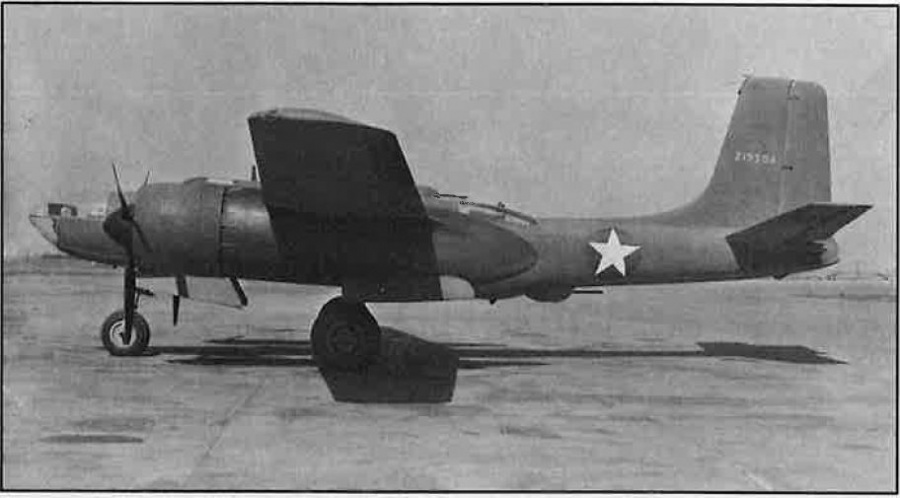
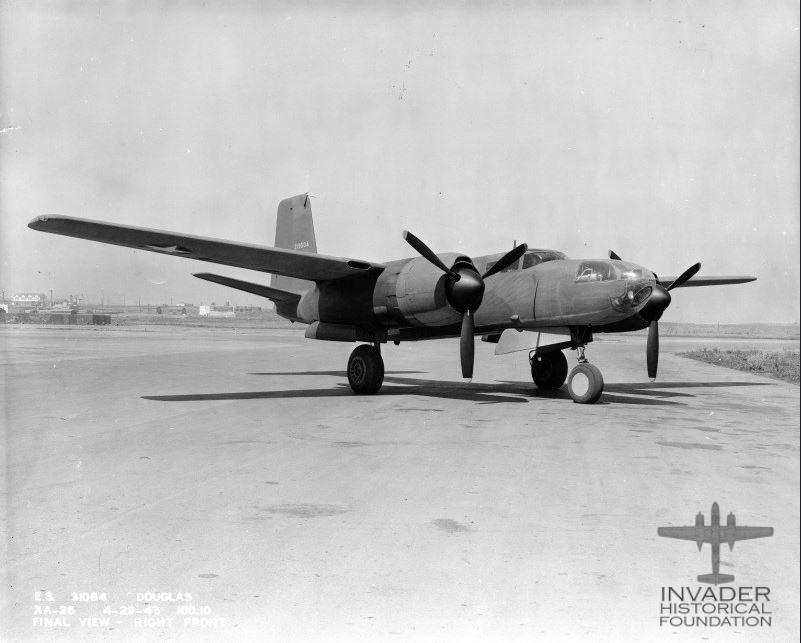
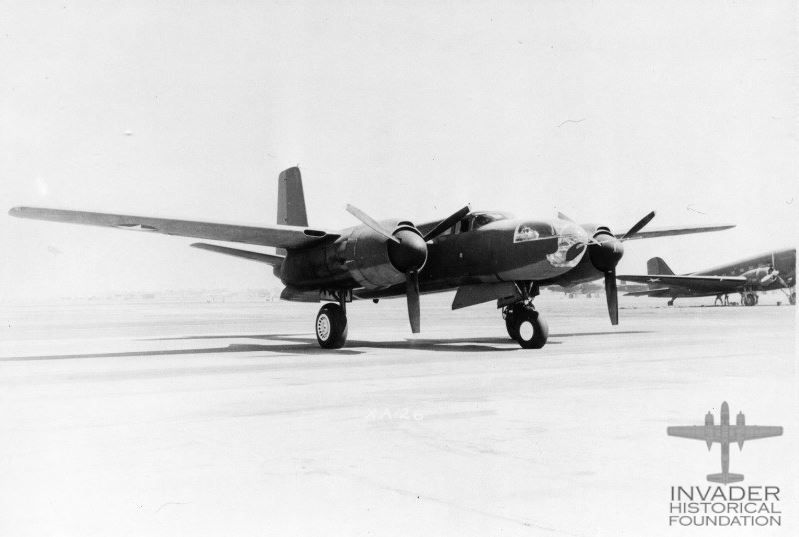
The XA-26 Prototype during takeoff, 10 JUL 1942.
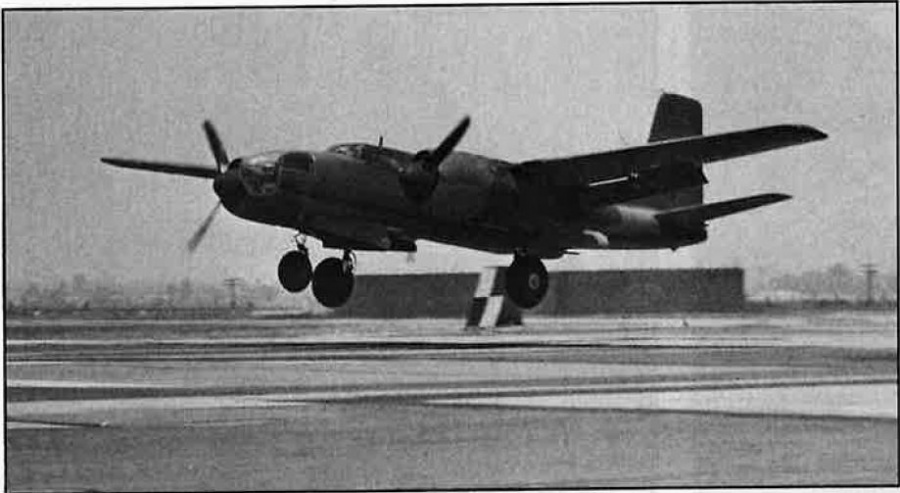
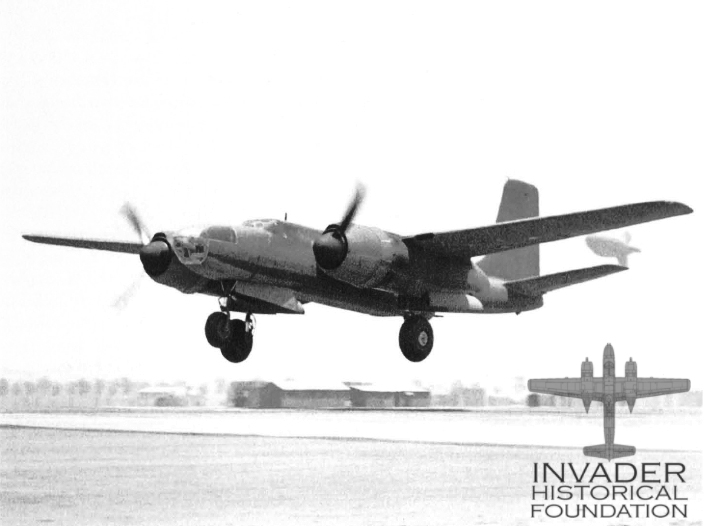
Sources
- Douglas A-26 Production List
- United States Air Force Accident Reports
- United States Air Force Individual Aircraft Record Card
- Francillon, René. McDonnell Douglas Aircraft Since 1920: Volume I. London: Putnam, 1979. ISBN 0-87021-428-4.
- Smith, A.M.O., "High-Lift Aerodynamics; the 37th Wright Brothers Lecture", AIAA paper 74-939, reprinted in the AIAA Journal of Aircraft, Vol. 12 No. 6, June 1975.
- Lednicer, David. The Incomplete Guide to Airfoil Usage. Champaign, Illinois: UIUC Applied Aerodynamics Group, 2010. Retrieved: 18 May 2011
- Mesko, Jim. A-26 Invader in Action (Aircraft Number 37). Carrollton, Texas: Squadron/Signal Publications, 1980. ISBN 0-89747-093-1.
